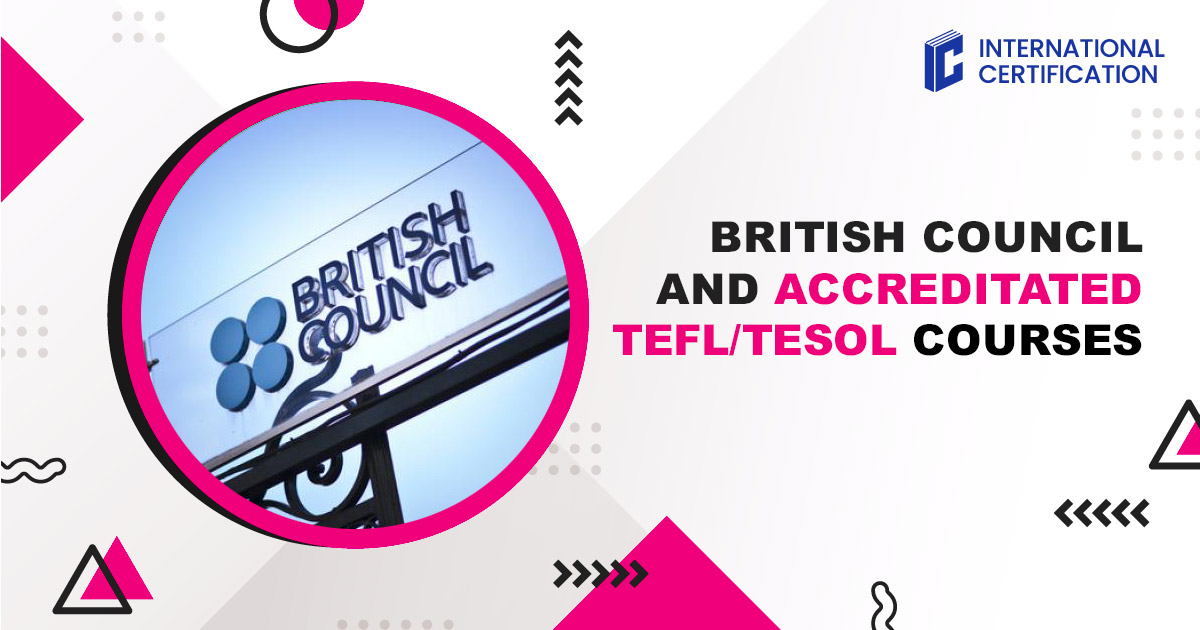And start earning money 💸 by teaching English in your own country, abroad, or online from anywhere on the planet! 🎁 Gifts and bonuses: professional support from your personal coach 🧑🏫 and job placement assistant 💼.
Table of contents
There is much information about working overseas such as where to work, how much you may earn, and what you must have. In fact, there is something more important and primary than that. Before you start packing and searching flight tickets, you should know what any ESL teacher must have to get a job. Teaching certificates such as TEFL, TESOL, and CELTA are vital for those who want to work abroad. Even if you have a degree in teaching, it's likely that employer will request one of those certificate additionally.
Don't be confused with abundance of acronyms, you will have to encounter even more learning one of the courses. Despite that all of them are quite respected and recognized worldwide, they are different in terms of applying. While you are reading this article you should decide what students you would like to work with, and how much money and time you can devote to studying. Are you ready? Let's break down the popular acronyms to know their meanings.
What do TEFL, TESOL and CELTA mean?
In order to understand the opportunities of those certificates better, let's see the meanings of ESL and EFL. As they are parts of TEFL, TESOL, and TESL, it's important to know what they refer to. Such letters as ESL represent English as a Second Language, whereas EFL — English as a Foreign Language. The point is that courses with ESL principles of teaching allows to work with non-native English speakers, such as immigrants, in countries where English is the official language. Trainings with EFL basis — make you eligible to work in countries where English isn't the native language. Finally, we know what TEFL and TESL mean, but what about TESOL?
TESOL is another umbrella term used interchangeably with TEFL and TESL. Despite TESOL program doesn't differ from TEFL and TESL, its tiny distinguishing feature is location. It's closer to ESL rather than EFL, and offers teachers to work in English-speaking countries. So, it's better to know what country you would like to work in before enrolling in a course.
Certificate of English Language Teaching to Adults (CELTA) is considered as the most prestigious brand of TEFL focusing on working with grown-ups. So, it limits you with a choice of students to work. On the other hand, CELTA is required worldwide, so you won't have problems in job searching anywhere.
But, the courses are different in many aspects such as duration, program, cost, requirements, and ways of studying. Let's dive deeper to know which fits you.
What is the duration of the courses?
Fortunately, teachers can choose a course length depending on their preferences. Whether you are ready to study a lot or only on weekends, there is always a choice. Some programs don't leave you much free time, that's why it may be hard to combine them with even a part-time job. As usual, employers pay attention to how many hours you have studied. It defines how much practice and information you have got.
As for CELTA, it offers four weeks of full-time studying. Add homework, and you will understand how hard it may be to work at the same time. The program consists of a hundred hours of classwork, and six hours of practicing in a class with students. Obviously, you will have to have a full available month to study and do homework to get CELTA.
When it comes to duration, TEFL and TESOL are more flexible. Their programs may last from twenty to three hundred hours of classwork. Apparently, you may complete the course both for a weekend, and for a few months. However, the minimum course that is mostly required by employers is one hundred twenty hours. 120-hour course is believed to be full of necessary fundamental principles of teaching.
Courses entry requirements
It is said that each course is flexible and fits almost every English teacher. If you check CELTA, TEFL, or TESOL requirements to enroll in a course, you will see that there aren't strict regulations at all.
As for CELTA, the official website of English Language Assessment offers the courses to:
- experienced English teachers who want to develop their professional skills;
- newcomers with no relevant experience;
- native speakers;
- non-native speakers;
- fluent English speakers;
- people who want to teach and travel;
- degree holders.
Can it be true? Let's find out.
According to people, who have already completed this training, it's really hard to do with English level less than Advanced. As the course is full of new terms, you will unlikely have much time to check new general English words in a dictionary. Another thing that CELTA-holders admit is teaching experience helps a lot during the course. Of course, no one says that it's impossible to complete the course with no experience, but let's be honest, it will be easier with it.
As for TEFL and TESOL requirements, they are:
- you should have at least B1 level to understand the course;
- you can be native and non-native English speaker;
- it doesn't matter whether you have teaching experience.
TEFL and TESOL programs are flexible and really fit both types of teachers. So, whether you are a rookie, or a qualified tutor, you will find valuable information there. According to the appropriate English level, the course isn't so complicated to understand. Anyway, you are the only who is responsible for your English knowledge, but, thanks to the courses duration, it lets you slow down to research.
Keep in mind that CELTA centres tend to arrange interviews in order to check your level and teaching knowledge. Moreover, CELTA requires applicants to have higher education in any major, whereas TEFL or TESOL don't care of it.
💡 Unlock the secrets to doubling your teaching income with our exclusive checklist! 🎯 This checklist is designed for English teachers who want to 📈 attract more students and 🔥 keep them engaged for the long term.
How are the trainings going?
Depending on your available time and possibilities, you can choose either online or offline training. The last one consists of two options such as local education, in your hometown or a city nearby, and studying abroad. The cost depends on the way you choose too. But let's see how your studying routine will look in each way.
As usual, CELTA offers 4-week training in many countries around the globe. It's also possible to choose your motherland as well. Anyway, the whole month will be quite intensive, and everything you will have time for is studying. Many teachers opt for international experience of studying abroad. And, just a few years ago, CELTA launched the online way.
Let's sum up what CELTA offers:
- face to face training either in your motherland or abroad;
- online studying with virtual classwork;
- mixed training with both types of learning.
TEFL and TESOL courses are flexible in terms of studying options too:
- group sessions abroad;
- classwork in local accredited centres;
- online way.
The last one is the most convenient and affordable for those, who can't spend a half day on studying. Online courses suggest you learning information at your own pace within access to the materials from 6 to 8 months. As always, it's possible to be extended if it's necessary. No worries, you will get your certificate online right after you complete a course. It's optional to order the hard copy from the UK.
What's the difference in cost?
Probably, that's time to decide how much money you are ready to spend and can. From financial perspective, the courses are completely different. Many people consider that CELTA is the most prestigious certificate. On the other hand, many teachers fail to pass the final exam because of its level of difficulty and intense pace of learning. Just imagine, you have to spend from $1,400-3,500 on the course, having the entry test and interview with no guarantee that you will pass the final exam and get the certificate with A. It sounds a bit risky. In addition, if you opt for studying abroad, keep in mind primary costs on accommodation, flight tickets, food, and medical insurance. It's hard to deny that such experience will cost you an arm and a leg. But it will be incredible hands down.
TEFL and TESOL, on the contrary, offer quite affordable options to choose. Depending on online or offline studying, you may pay from $200 to $1,900 for a course. Not only will you save much money, but also have comfortable pace of learning with no rush and stress. As the courses fit even Upper-Intermediate English learners, it is highly unlikely that you won't pass the final exam. Everything you need is to study.
🚀 More students, 💰 higher income, 🌍 complete freedom! ✅ 112 verified platforms with top rates ⏳ Flexible schedule – work whenever and as much as you want 🎯 Simple requirements – start earning right away 💎 Boost your career and income by teaching students worldwide!
Which certificate is better to choose: TEFL, TESOL or CELTA?
No one knows which certificate is better for you. As we have figured it out, it depends on many factors such as, your budget, English level, available time, and the country where you are going to teach. Having all information about CELTA, we know that it's quite expensive but exciting way of studying. Despite that many people believe that CELTA is the best among other teaching certificates, it's a brand of TEFL. Obviously, they are equivalent. Moreover, being a CELTA-holder you may teach only adults, which limits your career opportunities.
TEFL and TESOL are perfect for rookies and even dependent English learners. Studying online, you have about a half of the year to complete a course at your pace. Finally, it won't take much money and stress to get either TEFL or TESOL certificate. Finishing even 120-hour course, you will be able to get a cushy job in your favorite country.
In a nutshell, CELTA is for you if you:
- want to work with only adults;
- have a degree in any major;
- can pass entry English test and interview;
- are ready to pay much;
- are older than 18.
Whereas TEFL and TESOL fit those who:
- have at least Intermediate level or higher;
- want to teach people of different ages including teens and kids.
Video
Conclusion
It's up to you which training to choose. One of them is said to be the most prestigious and accredited by the University of Cambridge, but costs an arm and a leg. Whereas the others are quite affordable and flexible, having the same fame and reputation in the teaching community. Don't worry, employers require them equally.
Also, you can kill two birds with one stone, studying TEFL and TESOL at the same time. This training includes two directions, ESL and EFL, meaning you can teach in any country around the globe with no limitations. In comparison with CELTA, you won't have to choose what students you want to teach, you can have classes with teens, kids, and grown-ups. Learning TEFL/TESOL online, you can have your usual life, combining education with part-time or full-time jobs.
TEFL/TESOL offers three ways of duration:
- 120 hours;
- 150 hours;
- 250 hours.
It means that any of them will be enough to get a well-paid job abroad. Unfortunately, TEFL and TESOL courses don't have the only accrediting body, but there is one you can trust — ACCRIN. Be careful, there are many fake providers.
Enroll in online TEFL/TESOL course to get a certified English teacher in a couple of months. You will get valuable knowledge in learning approaches, making effective lesson plans, and even online teaching. That may be your perfect start of teaching English abroad. Now, you can purchase the course at a 50% discount with the employment assistant and native speaker trainer.
We hope, we have helped you to decide which course to pick. With whole information about the price, length, and requirements, you know the best and the most appropriate way to get a certified teacher. If you have any questions about getting teaching certification, leave them in the comments section below. We are always happy to help.
Terms used:
ACCRIN, CELTA, EFL, ESL, TEFL, TESL, TESOL

York Fern
An English instructor with 12+ years of experience. I work for an online school and travel the world, teaching students from various countries, leveraging my TEFL/TESOL certification. Seeing the world's oceans, mountains, and cities with my own eyes has given me a profound appreciation for the importance of quality education and international communication.
and start earning by teaching English in your country, abroad, or online from anywhere in the world! Order the course with a 50% discount 💸 and receive as a gift the support of a personal coach 👨🏫 and job placement assistant! 🎁🚀 Hurry, limited spots available! 🏃♂️💨
💡 Unlock the secrets to doubling your teaching income with our exclusive checklist! 🎯 This checklist is designed for English teachers who want to 📈 attract more students and 🔥 keep them engaged for the long term.
🚀 More students, 💰 higher income, 🌍 complete freedom! ✅ 112 verified platforms with top rates ⏳ Flexible schedule – work whenever and as much as you want 🎯 Simple requirements – start earning right away 💎 Boost your career and income by teaching students worldwide!
choose us?




